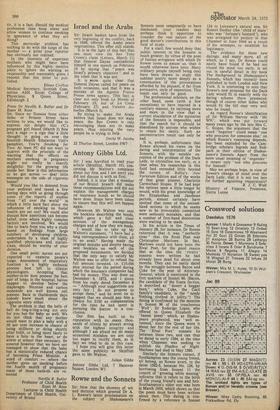Rowse and the Sonnets
Sir: Now that the showers of wit and derision which greeted Dr A. L. Rowse's latest proclamation on the subject of Shakespeare's Sonnets seem temporarily to have slackened, your readers may perhaps think it opportune to consider the real nature of the good doctor's contributions in this field of study.
For a start, few would deny that public interest in the Sonnets is much greater, by virtue of the pose of fustian arrogance with which Dr Rowse loves to amuse us, than it would otherwise have been. Many ordinary people (myself being one) have been drawn to study this sublime poetry more deeply as a consequence of the provocations afforded by his piquant, if far from persuasive, style of exposition. This result can only be good.
The professional scholars, on the other hand, seem (with a few exceptions) to have reacted in a contrary manner, by inclining more and more to the view that a correct elucidation of the mysteries of the Sonnets is impossible, and that the search for it should be abandoned by anyone who wishes to retain his sanity. Such an unconstructive result can only be bad.
It is, perhaps, unfortunate that Rowse allowed his views on the dating and interpretation of the Sonnets, with the notable exception of the problem of the Dark Lady, to crystallise too early, at a time when his researches in this field had extended little beyond the covers of Rollin's New Variorum Edition and of the works of that great pioneer, Charlotte Carmichael Stopes. If he had kept his options open a little longer he would, with his great knowledge of the Elizabethan and Jacobean periods, almost certainly have spotted that some of the secondhand notions to which he seems now to be irrevocably committed were seriously mistaken, and that a number of first-hand discoveries were waiting to be made.
In his article in the Times of January 29, for instance, Dr Rowse reiterated that it was " perfectly clear" that the Rival Poet was Christopher Marlowe. In fact, Marlowe could not have been the Rival Poet, for the good reason that at the time the ' rivalry ' sonnets were written he had already been dead for about nine months. They can be easily dated by the struggle between Bacon and Coke for the post of AttorneyGeneral, which is mentioned in the first quatrain of Sonnet 66. (Bacon, the candidate of the Essex faction, is described as "desert a beggar born," while Coke, the Cecil family's candidate, is the "needy Nothing clothed in jollity.") The dating is confirmed by the mention in Sonnet 96 of the treacherous ' Wolf ', Dr Roderigo Lopez, who offered to Queen Elizabeth the
basest jewel' which, as Shakespeare prophesied, was 'well esteemed, since the Queen wore it about her for the rest of her life. The 'Rival Poet' sonnets lie between these two, and can thus be dated in early 1594, at the time when Chapman was seeking to publish the Shadow of Night. Marlowe had died in May 1593.
Similarly the Sonnets cannot, if Southampton was the young friend, all belong, as Rowse avers, to the dates 1592-5, because No. 126, by borrowing from Sonnet 11 the conceit of 'growing while waning,' indicates that it refers to the birth of the young friend's son and heir.
Southampton's elder son was born in March 1605, which shows us that the poem must have been written about then. This dating is confirmed by a reference in Sonnet 124 to Leicester's natural son, Sir Robert Dudley (the 'child of state' who was 'fortune's bastard '), who was arraigned for perjury in Star Chamber in June 1604 as a result of his attempts to establish his legitimacy.
The evidence for these new datings, and many more, all of which, as I say, Dr Rowse could easily have found if he had not closed his mind too early, is set out in careful detail in my book The Background to Shakespeare's Sonnets, which has recently been published in both London and New York. It is interesting to note that Rowse's new proposal for the Dark Lady would fit in exactly with the dating scheme there presented; though of course other ladies who would fit the bill may very well also be found.
As regard Rowse's identification of Sir William Harvey with 'Mr WH ', which was put forward many years ago by the late Mrs C. C. Stopes, the argument that the word ' begetter ' could mean 'one who procures for someone else,' on which Rowse's reasoning depends, has been exploded by the Cambridge scholars Ingram and Redpath in their edition of Shakespeare's Sonnets. Apart from the more usual meaning of ' engender ' it meant only 'one who procures for himself.'
May we perhaps hope, in view of Rowse's change of mind over the Dark Lady, that it is not too late for further agonising reappraisals? R. J. C. Wait Ministry of Finance, Freetown, Sierra Leone


































 Previous page
Previous page